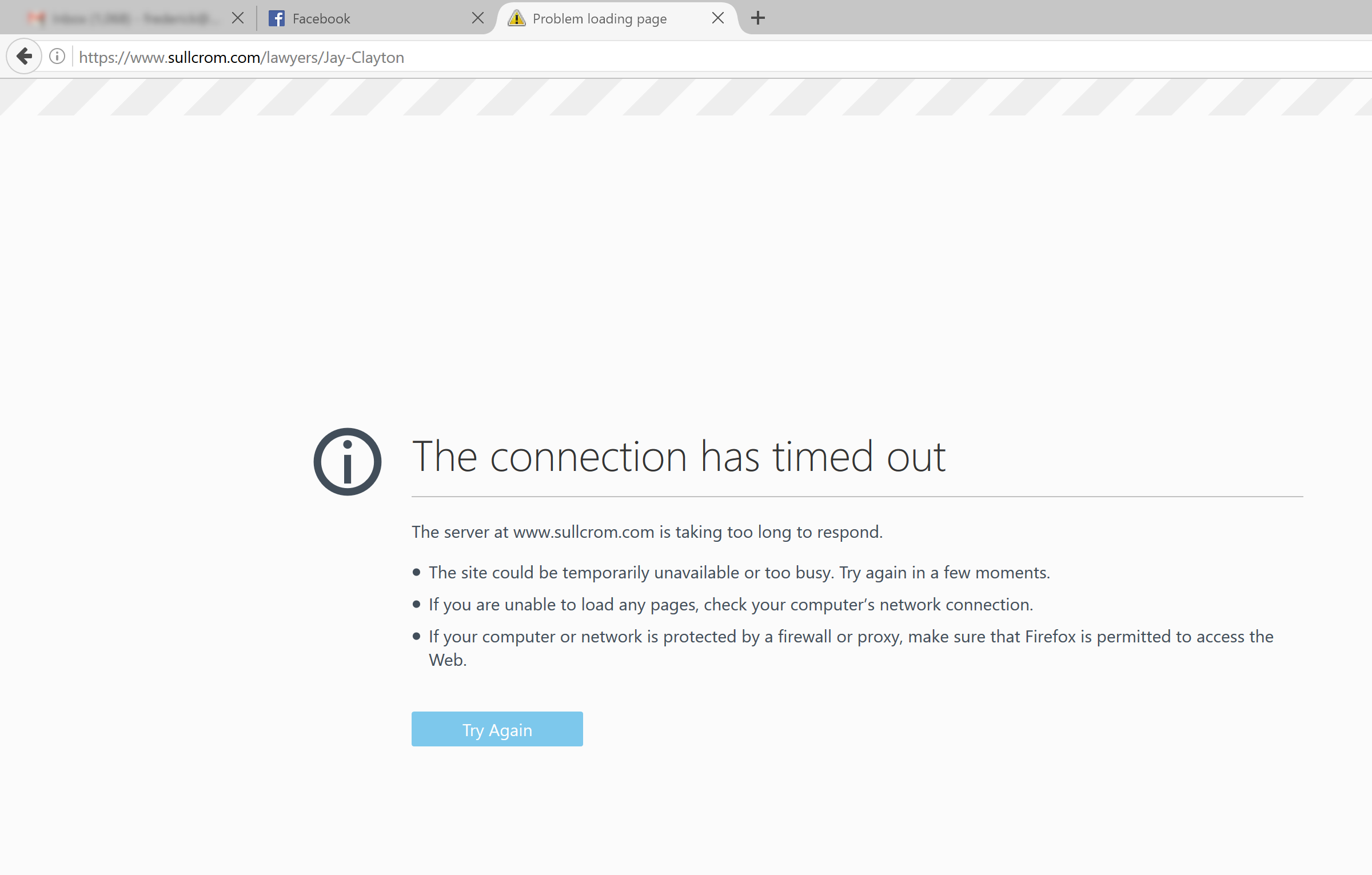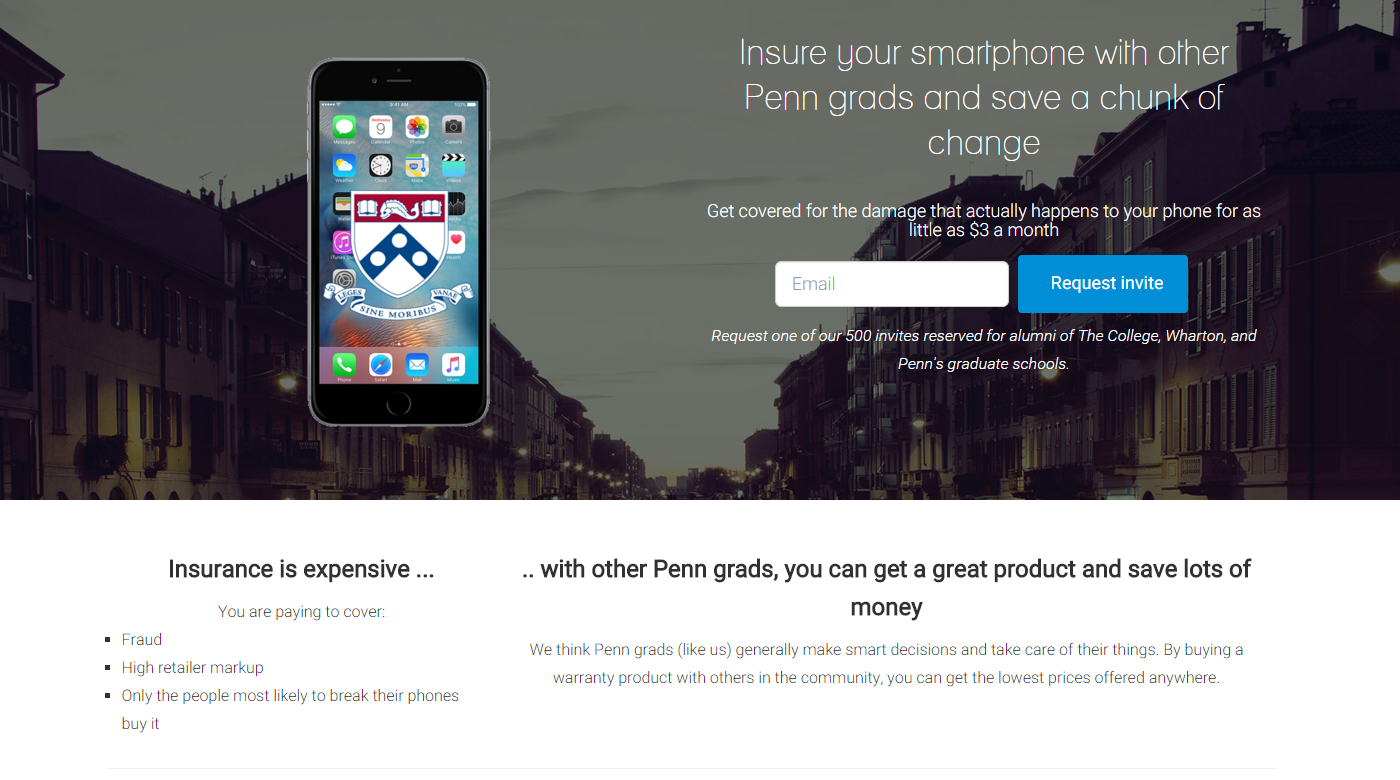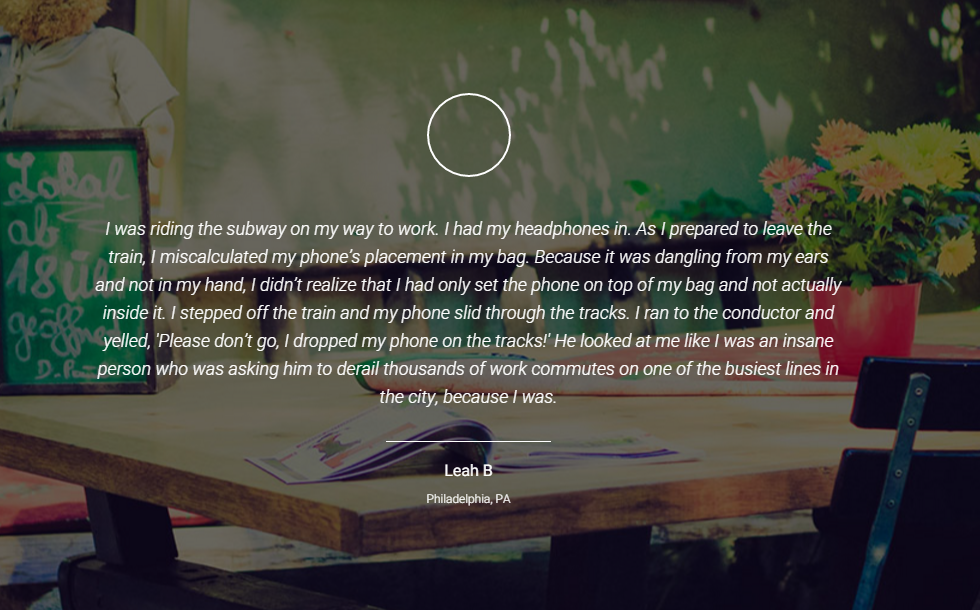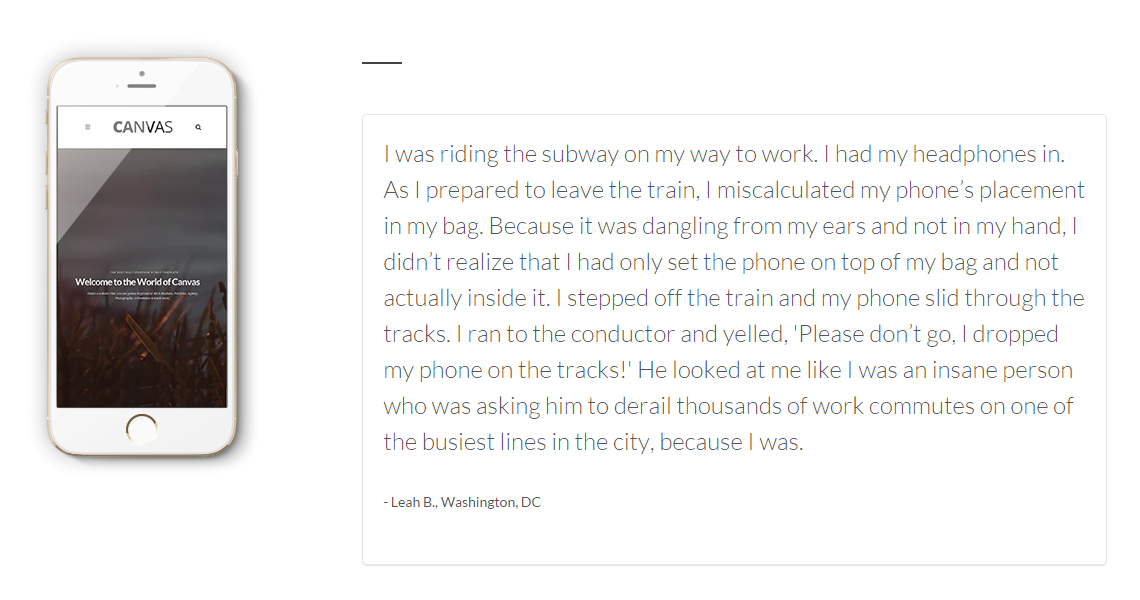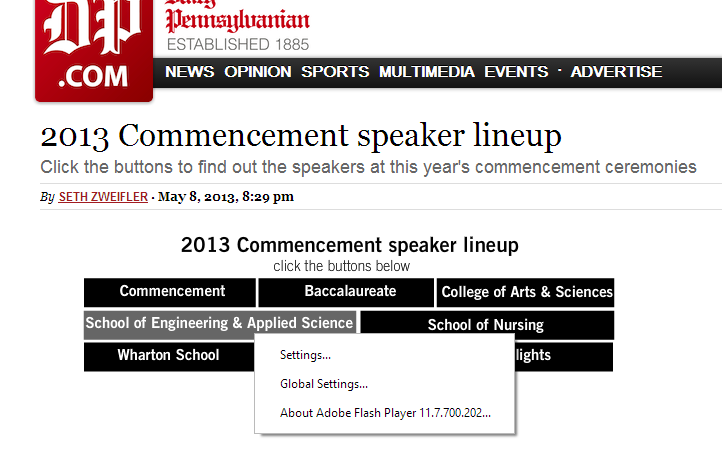It’s generally an honour to be appointed to serve as the head of a federal agency. After the revelation this morning that President-elect Trump will nominate a S&C partner to head the Securities and Exchange Commission, the whole law firm’s website appears to be down because of the increased interest:
Another startup blatantly steals university trademarks
A friend directed my attention to a startup-y website selling “cheap smartphone [insurance] coverage” for “as little as $3 a month”. Right at the top of the Penn-branded subdomain (penn.getcovered.co) was an iPhone mockup showing the Penn shield:
I highly doubt they went through all the trouble of actually licensing the trademark from the university. Penn’s policy on use of its logos by external entities provides (emphasis added):
Outside sponsors of University programs or activities often seek to use University names or insignia in promotional or advertising materials. While the University is pleased to recognize the contributions of sponsors, such recognition must not suggest University endorsement of the sponsor’s activities. Therefore, University names or insignia may not be used in connection with any outside entity’s name or logo without prior approval of the Secretary of the University. In general, the Secretary will approve uses which recognize or acknowledge the sponsor’s contribution to the University program or activity. Uses which, in the Secretary’s judgment, may suggest University endorsement or approval of the sponsor’s goods or services will not be permitted.
The big issue, of course, is the risk of confusion — by consumers, etc — who might think that the service is sponsored or endorsed by the university. There would be a pretty good prima facie case for trademark infringement, especially since the registrant behind the domain name appears to be a Stanford grad with no connection to Penn.
But to top it all off, the site seems to be lying on its face. The Penn page includes a quote from a “Leah B, Philadelphia, PA”:
but the exact same quote is used on the non-Penn-branded homepage of GetCovered, this time from “Leah B, Washington, DC”!
As an alum, I certainly don’t want the university’s shield to be used in connection with this company. What they’re doing is strangely reminiscent of the Campus Backup service that OCM was marketing a few years ago — which shut down after my blog post overtook their site in search engines.
Update (2015-11-02): a quick Google search of the opening sentence of the quote directed me to the source — a 2012 comment on a Gawker post by a Gawker contributor, no obvious connection to GetCovered.
How should Internet regulation of content work?
I first published the following query in a closed discussion forum for CIS 125/LAW 613 (Technology & Policy) at Penn Law. It is reposted here with minor edits.
Understanding the layers of the Internet (TCP/IP, etc) helps us to think about Internet governance in terms of allocating scarce resources, such as IP addresses and domain names. There is another layer to regulating the Internet that has little to do with scarcity or technical concerns: content on the World Wide Web. While people around the world effectively must agree to the same technical standards and the same mechanisms of allocating scarce resources in order for the Internet to function, there seems to be disagreement on which laws relating to speech and content apply, the geographic boundaries (if any) within which they apply, and to what extent foreign entities must comply. These concerns are obvious when we talk about the “Great Firewall of China”, highlighted by Google’s pull-out from mainland China, but less so evident when talking about countries that don’t use technical measures to censor citizens’ Web access.
This week, the issue became topical when Russia’s media/telecom regulator clarified existing rules on use of an individual’s image, seeming to outlaw certain forms of the Internet phenomenon known as memes.[1] The clarification came on the heels of a Russian court ruling in favour of a singer whose likeness was used without his permission in various Internet memes, some of which were unflattering. According to the Roskomnadzor—the agency that issued the clarification—as reported by the Washington Post, it is illegal in Russia to depict a public figure in a way that is unrelated to their “personality”, whatever that should mean. As expected, American media quickly seized on this act as part of a broader effort to control dialogue on the Web, at least within the Web as seen in Russia; noncompliance with the agency’s rules can result in a website being blacklisted in all of Russia.[2]
Setting aside any immediate visceral reaction that categorizes this as censorship, we might pause to consider Roskomnadzor’s justification, which pointed to the offence to celebrities’ “honor, dignity and business.”[3] But this is not some novel argument to protect celebrities at the expense of open expression; after all, even US law, which is weaker than European regimes that acknowledge a dignitary right in privacy, protects one’s likeness and privacy to some extent in tort, for very similar reasons.[4] And even if we disagree with the application of this principle in the agency’s rule, protecting individuals’ privacy and identity is still a legitimate state interest.
The real question, I think, is not whether Russia’s rule accomplishes the right balance of priorities, between privacy/control-of-likeness and open expression. After all, the extent to which the rule can even be enforced is dubious. (It would be a waste of resources for the Russian government to go after every meme of Putin on horseback.)
The much more interesting question for us is, to what extent should geopolitical nations be able to control content on the global Web according to their own sovereign laws? Moreover, given the borderless (by default) accessibility of websites and the diverse origins of Web publishers, is it reasonable to burden companies across the world with the task and cost of complying with a patchwork of nation-by-nation rules and judicial orders lest they allow their site to go dark in Pakistan or Russia or China?
In other contexts, like inconsistent cybersecurity laws across US states, companies have found it easiest to follow the strictest set of rules, hence simplifying their task. Maybe an image host like 9gag, catering to meme-makers, would find it technically easiest to comply with these inconsistent rules by deleting content whenever any nation complains. But then free speech everywhere is constrained to the narrowest rules among jurisdictions, so this is an unacceptable outcome. What is the alternative? Does the company have to add technical complexity to its systems to block Russian visitors only from accessing a picture of Putin? Isn’t this option economically inefficient?
Looking to a historical example, even a company that wants to stand up for human rights and free speech principles might find a weighty cost of defiance. In 2010, Google withdrew from operating the mainland Chinese edition of its search engine so as to relieve itself of the burden of obeying mainland Chinese regulations.[5] Reportedly frustrated with complying with strict censorship, and probably having small market share in the shadow of China’s Baidu, Google decided to redirect all mainland Chinese visitors to its Hong Kong edition, which operates under more lax rules. The cost of doing so? Losing relevance in the Chinese market.[6]
Many other companies lacking Google’s backbone and cash would likely roll over when requested to avoid losing their audience. Does this give too much influence to countries like the United States, China, and the UK, over what citizens can see on the Web? Is the Web any better under the rules of the superpowers than under the patchwork of nation-by-nation restrictions on free speech?
Footnotes
| 1 | ↑ | Megan Geuss, Russia’s Internet censor reminds citizens that some memes are illegal, Ars Technica (Apr. 11, 2015), http://arstechnica.com/tech-policy/2015/04/russias-internet-censor-reminds-citizens-that-some-memes-are-illegal/; Caitlin Dewey, Russia just made a ton of Internet memes illegal, Wash. Post Intersect Blog (Apr. 10, 2015), http://www.washingtonpost.com/news/the-intersect/wp/2015/04/10/russia-just-made-a-ton-of-internet-memes-illegal/. |
|---|---|---|
| 2 | ↑ | See Caitlin Dewey, supra note 1. |
| 3 | ↑ | Id. |
| 4 | ↑ | Restatement (Second) of Torts § 652A-E (1977). |
| 5 | ↑ | Jemima Kiss, Roundup: Google pulls out of China, Guardian (Mar. 23, 2010), http://www.theguardian.com/media/pda/2010/mar/23/google-china. |
| 6 | ↑ | See Kaylene Hong, Google’s steady decline in China continues, now ranked fifth with just 2% of search traffic, Next Web (Jul. 5, 2013), http://thenextweb.com/asia/2013/07/05/googles-steady-decline-in-china-continues-now-ranked-fifth-with-just-2-of-search-traffic/. |
Found some old screenshots…
When I first came to Penn, the website for the Nominations & Elections Committee looked like this:
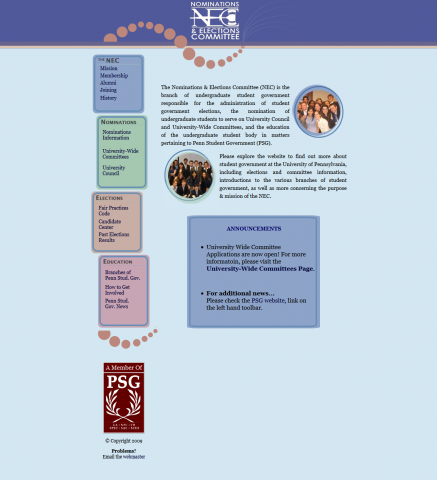
NEC website redesign
I set out to redevelop and redesign this, upgrading it from a static HTML site edited over SFTP to a WordPress CMS on Canvas. More importantly, the website redesign in 2012 needed to fit the rebranding that Penn underwent that academic year. In other words, I wanted it to look more like the university’s design. (An email to the Communications office responsible for web assets clarified that we could, in fact, do this.)
Google, you should know better

The YYYY-MM-DD format (%Y-%m-%d) is an internationally accepted, and standardized (ISO 8601) date format. The entire ISO 8601 system is based on big-endian ordering (greatest-to-least units) within the string, so… year, month, day, hour, minute, second. It makes a hell lot more sense than the American traditional MM/DD/YY format. So much so, in fact, that ANSI and the National Institute of Standards and Technology (NIST) have both adopted it. In some countries, like China, the traditional format in the language follows the same big-endianness: 2006年1月29日, which spells out 2006-01-29.
The advantage of this format isn’t just for programmers, where sorting dates and times requires no special logic (i.e. 2014-01-31 unambiguously precedes 2014-02-01, even if they were both written without delimiter symbols).
The format also eliminates any confusion between the fields. For instance, though colloquial American 11/12/13 should be interpreted as November 12, __13, it could just as easily pass for December 13, 2011. There is no room for confusion in 2013-11-12.
XKCD says it best:
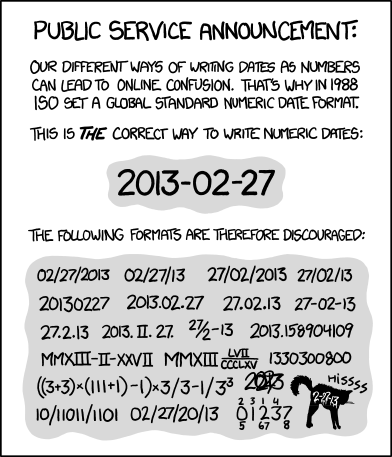
Now, it’s understandable that maybe Google needs to recognize people’s different formats of entering dates in their colloquial formats, like MM/DD/YY. But there is no excuse not to recognize the YYYY-MM-DD format.
Even more so, because the date in my screenshot, 1995-09-24, has no possible misinterpretation. To any rational human being, there’s no way to think that this is the 9th day of the 24th month (!) of 1995.
What’s wrong with the Internet?
BuzzFeed is not known to be a shining beacon of quality journalism. It has a reputation for link-bait headlines (“38 Crazy Things You Never Knew About Kangaroos”) leading to GIF-laden lists. It publishes quizzes (answer a bunch of seemingly random questions before a script shows you the logical conclusion of your answers) so unscientific that no one should ever take them seriously for big life decisions.
BuzzFeed thrives on the short attention span of Generation Z—children born into an age when they can expect news to be spoonfed to them in bullet points and images.
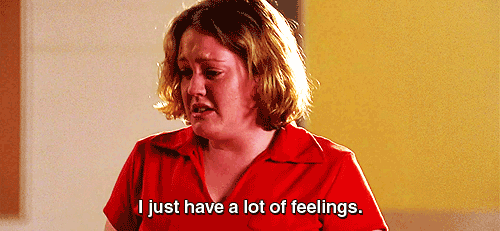
The people behind The Onion certainly saw right through this. They recently launched “ClickHole — Because all content deserves to go viral”, to parody both BuzzFeed and every other content-aggregating website that feeds on social media frenzies. (Worth mentioning: ClickHole parodies far more than BuzzFeed itself; it even incorporates references to “Upworthy, the feel-good viral-video site with a cloying habit of telling you what to think about its clips before you’ve even watched them.”)
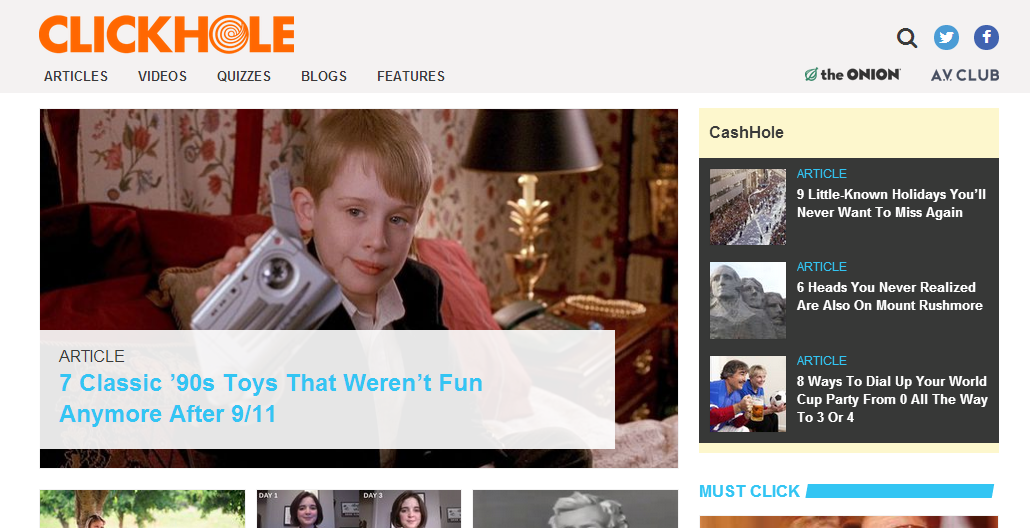
But BuzzFeed has also published some high-quality longform pieces, dubbed BuzzReads. These are serious articles that cover the entire spectrum of subject matter, from politics, to technology, to rape and social justice. They’re of sufficient quality that they could easily pass for an extended newspaper exposé or magazine centrepiece. Targeting a more mature audience seeking longer reads, these feature stories often carry the same socially-liberal perspectives espoused by the rest of the site, while employing words more eloquent than their pop-culture GIFs could ever be.
I’ve had my doubts that BuzzFeed can sell itself in both markets. As great as the quality of their content may be, and as awesome as their access to reliable sources might be (the site has a DC operation with press pass access), it’s hard to “[break] down the divide between the light and the serious.” It’s a challenge the site’s editors realize:
“I think we need to show people that it’s up to us to write it in a way that has the context, has a compelling narrative to it. If you give them more of this and mix it in with fluff, and it’s treated equally by the publication, the public will start to treat it the same way too.”
Two years later, I think they’re starting to make some headway, at least among the social media users who are more publishers than consumers. People are sharing BuzzFeed’s longform essays on social media, using the site’s content to express beautifully the thoughts they could not write themselves.
What’s the reception like? I think many people on the consuming end of content are still sometimes skeptical. And I’m not sure that many people associate BuzzFeed sufficiently with quality content that they would be willing even to give reading BuzzReads a chance.
Case in point? This ignorant comment posted by a BuzzFeed reader on a post about the termination of American Apparel CEO, Dov Charney.

That article wasn’t even a longform essay. BuzzFeed had, through an anonymous leak, obtained an exclusive copy of the CEO’s termination letter, which no other news outlet reportedly had done. It was news, and it was worldly.
Apparently too worldly for this one commenter, who seems to think that only funny, entertaining, and “pertinent” (whatever that means in this context) content deserves to be published on a site from which they expect only entertainment.
I would be a fool to equate this one person’s opinion with everyone else’s. However, this is merely one example of the derisive attitude towards long online content I’ve witnessed first-hand—scroll through my Facebook timeline, or my friends’, and you will certainly find that GIFs and short interactive quizzes get more likes and click-throughs than essays about anything.
Why is that? It’s not like everyone is working 18-hour days in finance… Why don’t we, college students and young professionals, seem to have time for intellectual engagement outside of the classroom, on the Internet?
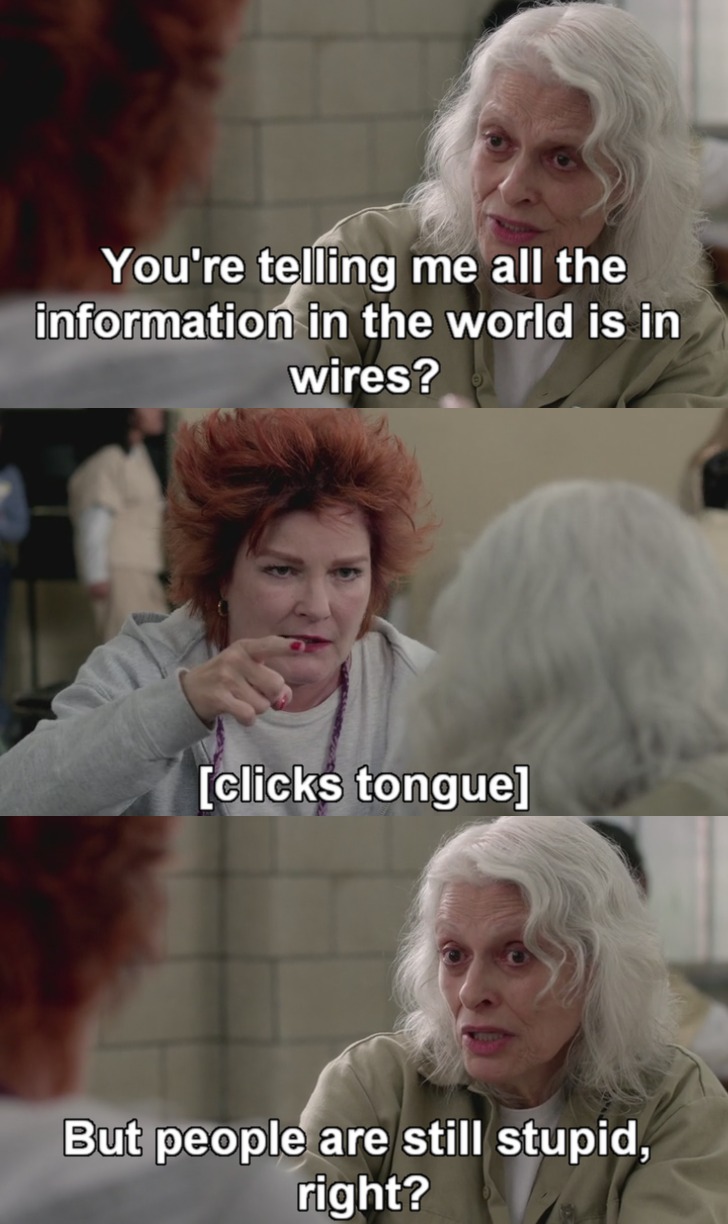
This old lady learns about the Internet for the first time, in Orange is the New Black—my newest favourite show. “But people are still stupid, right?” Indeed, the very technologies that made information so much easier to access, also made it easier to seek information in the shortest tidbits possible. Why read an entire screen of text, if you can get the essentials in 10 animated images?
There’s something deeply disturbing about this trend. It’s different—markedly different—from high school classes recognizing comic books as valid literature. This is a trend that makes education and self-expression more difficult, and less valuable in the eyes of this generation.
Media in our technological age must seek not only to earn pageviews, but also spark deep, insightful conversations about important contemporary issues. Instead of stooping to the lowest common denominator, as BuzzFeed seems to have done in its early launch, they have to champion the cause of literacy and engagement.
Why are genuine discussions about ethnic conflict or self-determination (indeed, a late-night discussion I’ve had quite a few times this week with my friends) outside of the academic environment so rare? Maybe, in part, it’s because of the Internet we consume.
Spambots gone wild
On one of my sites running WordPress, Akismet (and other antispam plugins) is not installed. In some ways, it has served as a honeypot, revealing interesting tidbits about how spambots work.
Fascinatingly, there were several hundred of these comments, all identical to each other. They look like templates for comments to be generated by spam-producing software, except that the software never processed the templates and posted them verbatim instead:
When NOT to use Flash
I’m calling out The Daily Pennsylvanian for worst uses of Flash, ever. Flash animations make sense when interactivity is demanded, and only then, in rare cases.
A couple of months ago, this happened: a post lauding the university for winning the 2012 CIO 100 Award for mobile-friendly sites, using Flash as the only content on the page:
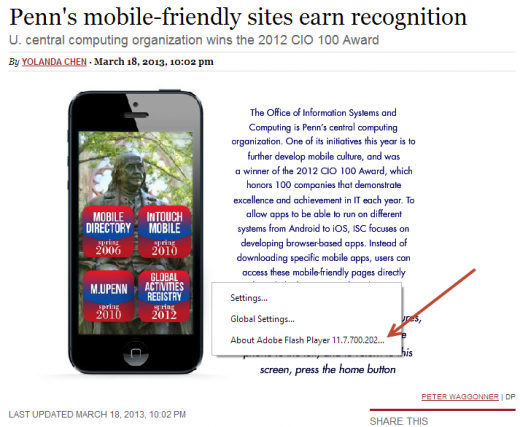
To top it off, guess what the mobile site shows on a phone?
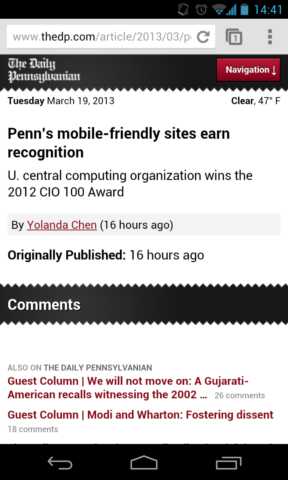
Yeah, that’s right. A blank article.
I wouldn’t be so mad if it were a one-time thing. But then this illustration of our commencement speakers was published this week:
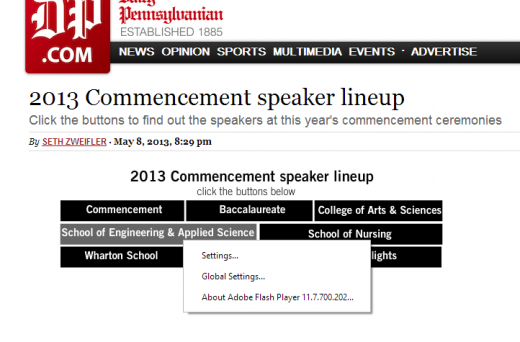
Again, a blank article shows on mobile. And it’s not just my phone that does this: development of Flash for mobile was halted nearly 2 years ago, and iOS has clearly not had Flash since the start.
But my gripe isn’t with Flash itself, or even with mobile compatibility — I’m just upset that people are using a medium that doesn’t make sense for things that shouldn’t even be interactive. I get it; college kids like to play around with software, or whatever. But you guys gotta stop this.

